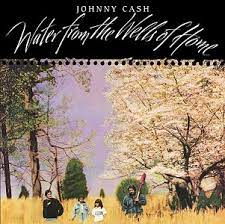After recording a wealth of songs with Cowboy Jack Clement for his Mercury Records debut, Johnny toured for the summer, and then hammered out a greatest hits album in October 1987. Within days of overdub sessions in December, he was back in the studio with Clement starting another album. While the sessions were a mix of solo material and collaborations, the final product is essentially a duets album. Some big names are involved in this one: family members (June, Rosanne, and John), usual suspects like Waylon Jennings, Jessi Colter, Tom T. Hall, and Emmylou Harris, but also Hank Williams Jr., Glen Campbell, and none other than Mr. Moptop himself, Paul McCartney.
A combination of guests like that seems very encouraging. Dig a little deeper, though, and we’ll find the usual warning signs: very few Cash originals and a six-month recording window. Oh, and a host of professional session musicians, but none of Cash’s band involved.
This is not to say this album is without its charm. Yes, it’s a pretty relaxed album where all of the edges are smoothed out into an inoffensive, 80s middle-of-the-road country gloss. It does, however, happen to have some very strong performances. Emmylou Harris’ voice sounds so good, whether it’s duetting on the Roy Acuff number As Long As I Live, or melding into four-part harmony with Johnny, Jessi, and Waylon on the 1948 Moon Mullican classic Sweeter Than the Flowers. Throw in some pedal steel and fiddle and you’ve got some very fine country.
The middle of the album brings in a bit of attitude, too, with Tom T. Hall’s The Last of the Drifters, an outlaw number that might over-romanticize the post-war era, but is a needed dose of energy. Also, Hank Williams Jr.’s That Old Wheel is a dose of 80s positive thinking:
“They will sow what they reap/ so turn the other cheek.”
It’s a nice upbeat rockabilly number, with a great guitar solo. I also find the June duet, Where Did We Go Right?, a charming reunion. Knowing the trials of addiction and infidelity they’d been through, and the fact that it’s been several albums since there’s been a proper June duet, it’s a refreshing turn of positivity for country’s first couple. They obviously liked this song as it was first attempted in the Coming to Town sessions and they debuted it in early 1987 on Austin City Limits.
But for every decent number, there’s also a miss. I’ll start with John Carter Cash’s two numbers. John started appearing on stage with his dad in the late 70s, and by the 1986 Christmas special he was miming electric guitar and shouting out Johnny B. Goode. He brings that rock attitude to J.J. Cale’s Call Me the Breeze, but he simply doesn’t have the vocal chops to rock out. (I will give credit to a great but brief electric guitar solo by bluegrass master Mark Howard). His strained rock style feels even more limited on the closing ballad, Water From the Wells of Home. Despite being penned by Father Cash, the whole song just feels tired and uninspired.
Uninspired could be used to describe the other misses here, too. A Croft in Clachan should be an instant win. Johnny loves historical material, and here tells an interesting story of a Scottish clan feud. But even with a voice like Glen Campbell joining in, the song goes nowhere. Likewise, New Moon Over Jamaica might have been written by three masters – Cash, Tom T. Hall, and Paul McCartney – but it’s a boring dud of a song. Come to think of it, George Harrison was always the Beatle with a rockabilly fixation, so maybe he should have been called on instead. He certainly did better with Roy Orbison in The Travelling Wilburys, than McCartney does with Cash here.
In retrospect everything that’s good and bad about this album is encapsulated in the first track, a remake of Johnny’s Sun Records hit, Ballad of a Teenage Queen. It’s beautifully sung by Cash, daughter Rosanne, and the Everly Brothers. Everything is sparkly clean. But it’s also played a hair too slow, and then it closes with a superfluous strum of a harp. Why? Did anyone ever listen to the Cash classic and think, “what this is missing is a little harp”? Of course not. But it’s a case of throwing a little bit of everything at the wall to see what sticks. Sometimes it works pretty well, others, not so much.
As with Johnny’s Mercury debut, it seems there was actually quite a bit left on the cutting room floor here, too. In addition to starting more songs that would wind up on The Mystery of Life there were several solo songs cut – Love’s from the Heart, I’m Gonna Write You a Letter, Kris Kristofferson’s Good Morning John, Kiss the Ladies Goodnight, and Just The Other Side of Nowhere – plus two more duets, namely, I Wish I Was Crazy Again (Waylon Jennings), and Didn’t He Shine (Glen Campbell). Could Johnny have dropped the duets format and beefed the album up with some solo numbers? Who knows.
So, at the end of the day, we’re left with another pleasant, but somewhat uninspired album, a pattern that will sadly carry through to the end of the Mercury era.
3/5
Other Songs from the Era:
- Johnny Cash Interview – a bonus track on some versions of the CD
- We the People – Folk Era records ,released this compilation of patriotic songs to celebrate the bicentennial of the signing of the US Constitution. It includes four older Cash tunes – Ragged Old Flag, Ballad of Ira Hayes, Remember the Alamo, and Battle of New Orleans – along with new narration that is used throughout the album.
- Just the Other Side of Nowhere – recorded in August 1988 and used in the film Tennessee Waltz.
